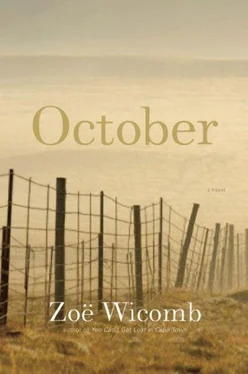Here in Kliprand, trapped in this cramped house where Jake lies in a darkened room, it would seem that she must be the angel of mercy, though what quality of mercy she cannot imagine. All she knows is that it won’t be easy, that its twice-blessed promise has to be taken with a pinch of salt. Rather, it will be a haphazard affair, like groping for an herb or spice in a dark cupboard, any herb or spice for flinging into a tasteless stew. Mercia does not see herself as being up to the task. No, it’s ridiculous. Jake can’t expect her to take the child.
The child seems about five years old, but how would Mercia know, having had so little to do with children? There is the full mouth and the brow of the Murrays to identify him as one of them, but he is very like his mother, more’s the pity. It puzzles her, Jake’s retreat to Kliprand. They have always talked about it as a place to leave behind, so why has he stayed and taken this Kliprand girl as wife? Mercia corrects herself; she must not be unkind or snobbish, must also try to see things from the mother’s point of view. It is difficult though, given Sylvie’s eagerness, the way she presents the child like a trophy, as if reproduction were a feat.
The child is uncomfortable. His eyes flit between his shoes and Mercia’s face, but then, as if preparing himself for combat, he boldly returns her stare. Shame, his eyes sparkle; he is a little boy with an irrepressible brightness about him. The brightness tugs at her heart, or is she being unsettled by the word that has crept up on her? For it suggests to her that he is doomed, that he will pay for the sins of others. Mercia wishes that her father’s horrible notion of sin would keep out of her consciousness. The boy is bright, new as a penny, but then one would imagine that all children are necessarily bright and new, that is, until they are scuffed or battered by parents. Who may not mean to, as the poet has it, but nowadays even that sounds optimistic.
For all his brave stare, there is something about the child, something that casts a shadow, a guardedness perhaps, and there is, if she is not mistaken, a faint trembling of his chin as if he is summoning the courage to speak. Like an old man he runs his hand across the tight black curls, then settles his shoulders in an extravagant gesture of nonchalance.
Nicky, this is your auntie Mercy. Give Auntie Mercy a kiss, his mother commands. Mercia winces at the woman’s loud voice.
No, he says. Upon which his mother slaps him decisively about the legs; she will not have any rudeness from him. The child does not flinch. He steps forward and formally holds out his hand for Mercia to shake, so that his barely proffered cheek discourages kissing. The gesture relieves for her the shock of the smack. Should she say something? Let the woman know that it is despicable to beat children? But then, what difference would it make; the mother — for that is how she thinks of Sylvie, formally, in terms of the biological relationship — would pay no attention, would think of Mercia with her fancy foreign ideas as meddling. Oh yes, Mercia all but hears her say, there overseas where people still are decent, children may know how to behave and so, of course, do not need the belt. But here, in this godforsaken place, nothing other than a smack will keep a child on the straight and narrow, prevent him from diving straight into indecency and drunkenness. Things have really gone wild in this New South Africa. A person can’t allow any rudeness at all; give them a pinkie and they grab the entire hand; and besides, what did Mercy know about being a parent?
The trick is not to give the woman too many opportunities to air her views. But the smack, the affront, smarts in Mercia’s own flesh, so that she drops to her haunches and pats the boy about the legs where she imagines the imprint of his mother’s hand lingers under the synthetic fabric, a gesture that the mother understands only too well.
It is I, his mother, Sylvie says, only I, who have to see to him, make sure he behaves, right from when he was only so small, and her flattened palm skims the imaginary head of a smaller child. This Nicholas boy is now stubborn, even as a baby he always wanted his own way. Takes after you people, the Murrays, so I have to make sure from the start that he does as he’s told. And my word, you just have to beat him before he’d listen, enough to break any mother’s heart. That brother of yours does nothing, doesn’t care, leaves us to find our own way, just as long as he has his bottle. She giggles. Like a baby really, before her face straightens and resumes: that is why the child must now look to you, the auntie, for help, for direction to his life. As I said to Nicky, just because your father is useless doesn’t mean you don’t have family to keep an eye on you. Auntie Mercy — you are all he has left.
Sylvie knows that this is what Jake calls whining, but she can’t stop herself from piling grievance upon grievance, from uttering the thoughts that nibble day and night with no hope of abatement. If it were not for her part-time job at the butcher’s shop, what would they eat? And the worry about the child — whether his father, now apparently confined to bed, can care for him even for the few hours that she’s at work. Then there are the years to come, clothing, schooling and all the gedoente of growing up. God alone knows what they’ll do, she and the child, what will happen to Jake, who is surely drinking himself into an early grave. If she could keep Nicky on the straight and narrow he could be a doctor, a real doctor, she adds pointedly.
Mercia tries not to look at the woman’s arms, the emphatic hands held up in a gesture of helplessness. She imagines those elbows poking out of a tub of minced meat, as Sylvie kneads, her arms coated in grayish grease, whilst an even, steady sausage of speech issues from the girl’s mouth. She is embarrassed, critical of her own snobbery, but really there is no chance of correcting herself while the girl shouts as if she were in another room.
Mercia recalls the wording of Jake’s brief letter: You are all he has left, which the mother echoes. There is no telling whether he had consulted with Sylvie, but now it does seem as if Sylvie too wants to wash her hands of the child. What on earth is Mercia to make of these people who belong to her? She cannot suppress her disgust at the fecklessness, the shamefulness of having a child whom you then hand over to someone else.
Still on her haunches, she says to the boy, quietly, Would you like to take me for a walk, show me the veld? She points ahead to the kloof that plunges into the foot of a hill. Let’s go, you can be my guide, she says in her halting Afrikaans. How odd that Jake’s child should speak Afrikaans. What it surely shows is that Jake does not speak to him at all. How has her kind, loquacious brother come to be such an irresponsible father?
The mother intervenes. Answer your auntie. I don’t think he can hear your whispering, she says. The shadow of a smile hovers on Sylvie’s face; it is clear that she knows exactly why Mercia has lowered her voice. The girl may be vulgar but she is certainly not stupid.
But I don’t know the way, I don’t know what’s there, I’ve never been to the veld, Nicky says earnestly, and looking at his feet, I’m not allowed to spoil my good clothes.
In perma-pressed long trousers and a long-sleeved shirt buttoned to the throat, the child is overdressed, a parody of a businessman. He wears Mr. Price’s cut-priced shiny black school shoes and socks. Not surprisingly, he is damp with sweat.
Oh, Mercia says airily, we’ll make sure your clothes don’t get messed up; between us we’ll manage. Sometimes you may think you don’t know the way, but actually once you set out find that you can follow your nose, find that you know it quite well.
Читать дальше












